International Conference/International Exchange
- HOME
- International Cooperation
- International Conference/International Exchange
- Participation in the 61st Session of the Commission on the Status of Women
International Conference/International Exchange
- CSW
-
Participation in the 61st Session of the Commission on the Status of Women
Date:March 13 to 24, 2017
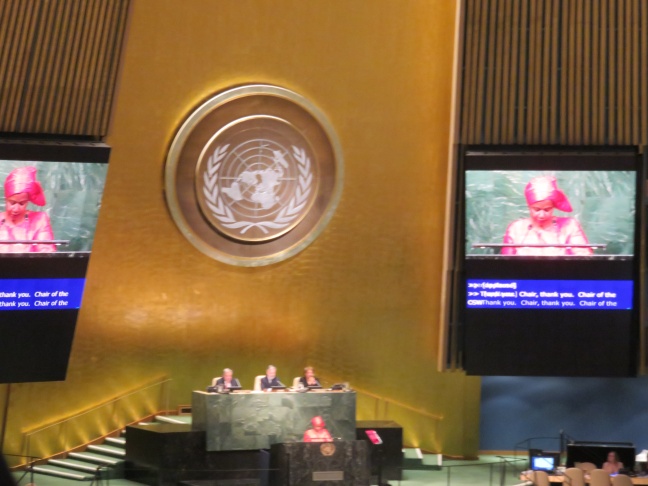 Ms. Phumzile Mlambo-Ngcuka, Executive Director of UN Women, speaking at the opening ceremony
Ms. Phumzile Mlambo-Ngcuka, Executive Director of UN Women, speaking at the opening ceremony
The 61st session of the Commission on the Status of Women (CSW61) was held at the United Nations Headquarters in New York from March 13 to 24, 2017. Two members of NWEC staff, one from each the Office of Research and International Affairs and the Program Division, participated as members of the Japanese government delegation. Held with “Women’s economic empowerment in the changing world of work” as its priority theme, CSW61 comprised statements by country representatives, UN entities and NGOs; voluntary presentations; ministerial round tables; and interactive and expert panel discussions. In the Review session themed “Challenges and achievements in the implementation of the Millennium Development Goals for women and girls,” which sought to evaluate progress made on previous CSW themes, participants shared their achievements with respect to the Millennium Develop Goals, the deadline for implementation of which was 2015, and challenges remaining in each country.
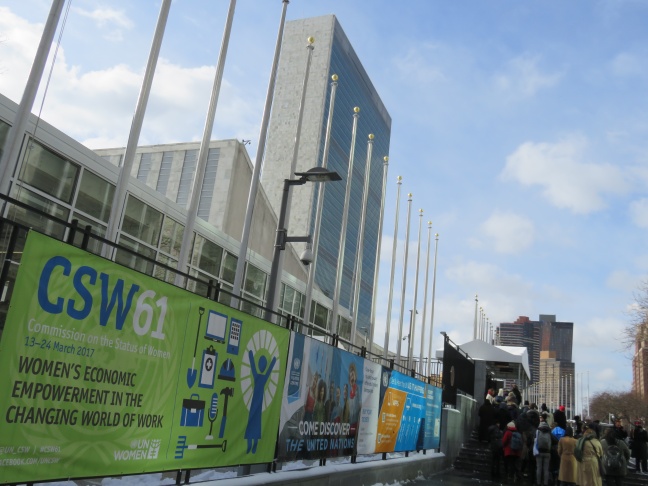 The UN Headquarters building bustling with the daily crowds
The UN Headquarters building bustling with the daily crowds
Parliamentary Vice-Minister for Foreign Affairs Motome Takisawa chaired a ministerial round table on behalf of the Japanese government. Engaging in discussion with other country representatives about what kinds of policies can effectively support the economic empowerment of women engaged in informal and non-standard work, and the impact technical advances and innovation are having on women’s economic participation, he also introduced Japanese initiatives.
In Japan’s country statement presented on March 15, Japan representative Hiroko Hashimoto cited Japan’s initiatives to restrict long working hours and promote workstyles conducive to a work-life balance. With regard to international cooperation, Japan highlighted its intention to invest three billion dollars into projects contributing to protection of the rights of women and girls living in developing nations by 2018, and the importance it places on women’s lifelong learning and furnishing a gender-sensitive education environment.
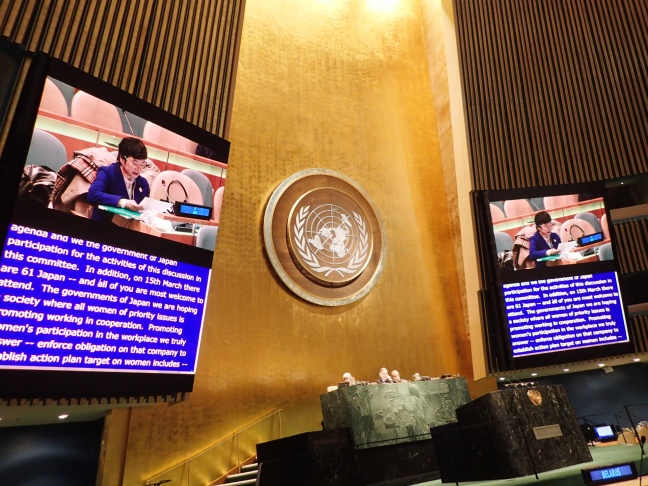 Japan representative Hiroko Hashimoto
Japan representative Hiroko Hashimoto
On the afternoon of March 14, the ministerial round table was interrupted for three minutes for a campaign to raise awareness of the gender pay gap. On average, women only make 77 cents for every dollar a man earns. When this figure is applied to an eight-hour working day, women’s labor after the first 6 hours and 10 minutes goes unpaid. According to the Global Gender Gap Report, gender wage gaps exist in every country worldwide, and at the current pace, estimates indicate it will take 70 years to eliminate this difference. Based on this fact, the Chair explained the campaign’s goals; women read magazines, posted tweets, and engaged in other “after-work” activities as a form of demonstration; and men pretended to serve drinks in paper cups emblazoned with the slogan “Equal Pay NOW!#CSW61”. The campaign concluded with the screening of a short video produced by UN Women.
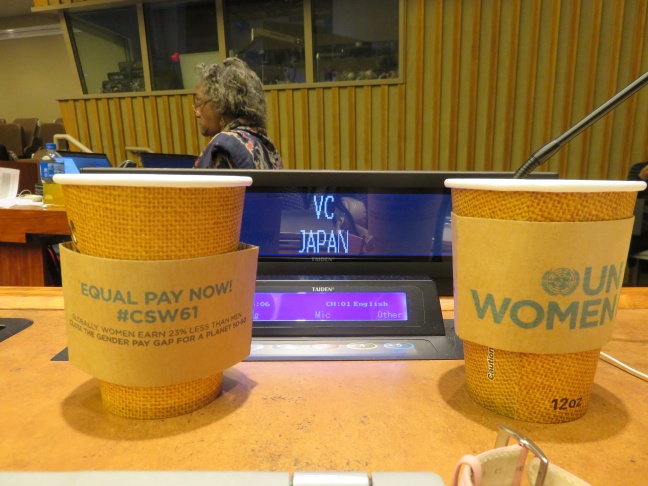 Items distributed to appeal for elimination of gender wage gaps
Items distributed to appeal for elimination of gender wage gaps
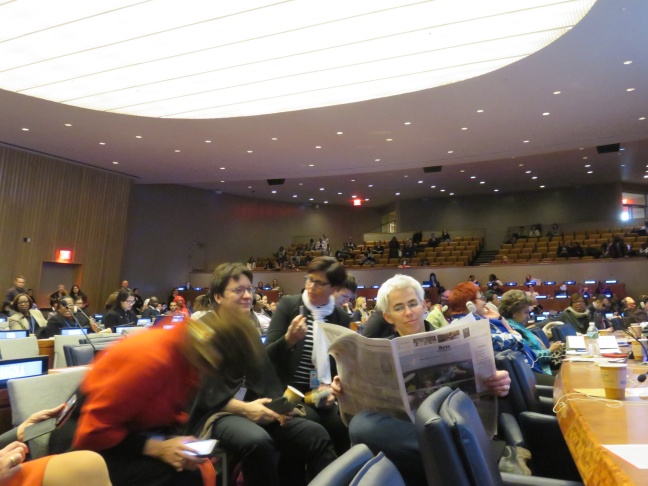 Campaigning for elimination of gender wage gaps (German government delegation)
Campaigning for elimination of gender wage gaps (German government delegation)
Numerous events are held alongside the official meetings during CSW sessions. From 3pm on March 17, representatives of the Permanent Mission of Japan to the United Nations partnered with three NGOs to hold a side event themed “The keys to the economic empowerment of women.” In addition to Japanese experts from the UN, JICA and other organizations, representatives of the French and Australian governments also made reports. Attendance at the venue exceeded seating capacity indicating the high level of interest in reports on the situations surrounding Japanese women.
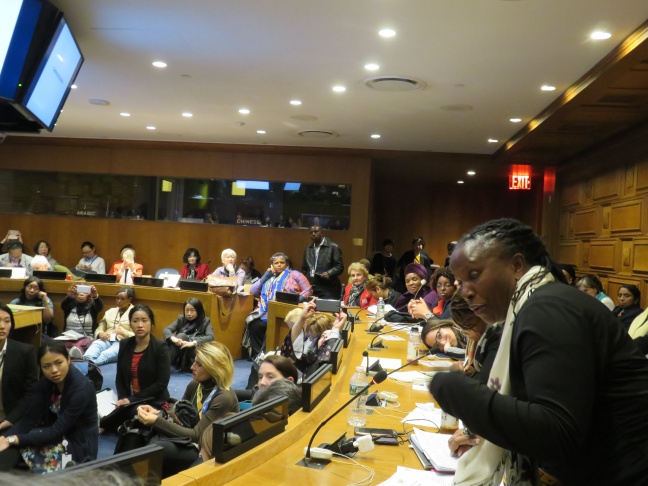 Japan’s side event elicited a lively question and answer session
Japan’s side event elicited a lively question and answer session
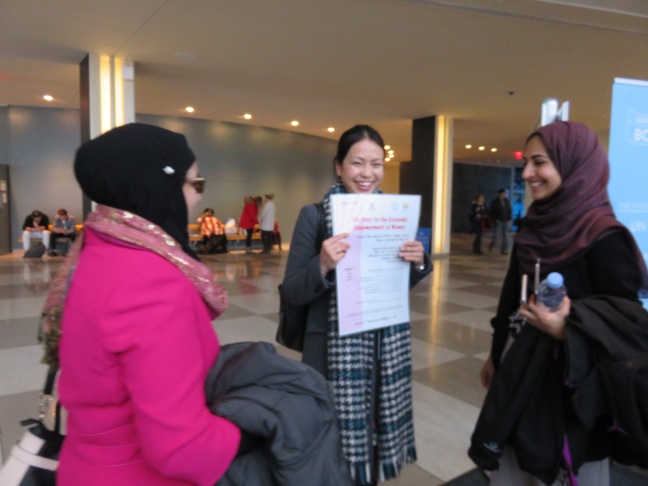 Attendance of young participants was noteworthy
Attendance of young participants was noteworthy
The second week began on Monday, March 20. Despite freezing temperatures and roadsides piled high with snow from the previous Tuesday, the second week was blessed with fine weather. An interactive and expert panel discussion entitled “Enhancing availability and use of data and gender statistics to support accelerated implementation of the Beijing Platform for Action and the 2030 Agenda for Sustainable Development” was held from 10:00 to 13:00 on March 20. Chaired by Mr. Andreas Glossner, Vice-Chair of CSW61, four panelists took to the stage to advocate the necessity of expanding the availability and use of gender statistics in terms of accelerating the 2030 Agenda for Sustainable Development, and press for governments to update their techniques for collecting data, and to strengthen liaison and collaboration.
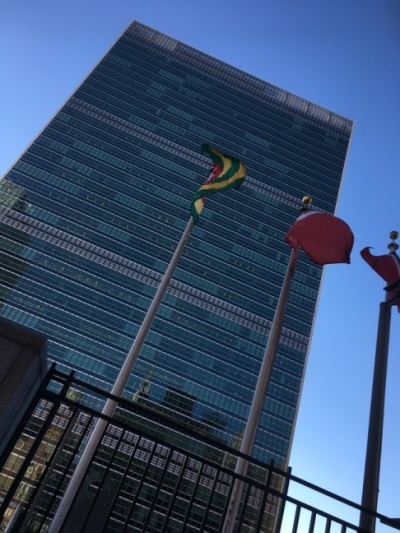 Clear blue skies accompanied freezing temperatures in New York!
Clear blue skies accompanied freezing temperatures in New York!
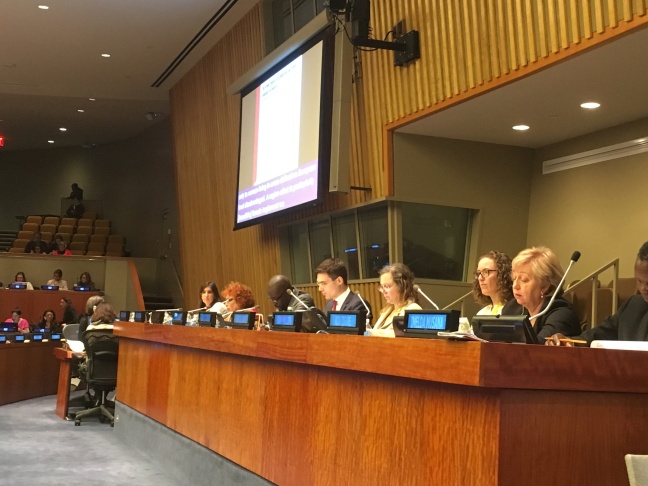 An expert panel discussion held on March 20
An expert panel discussion held on March 20
A General Discussion postponed because of snow was held in the afternoon, and representatives of Cameroon, Bangladesh, Singapore and several NGOs introduced initiatives they have taken in line with this year’s theme.
Discussion on the Agreed Conclusions that began the previous Friday continued on a daily basis from Tuesday, March 21. This year’s theme "Women's economic empowerment in the changing world of work" included highly contentious issues, and although the first draft was just 6 pages long, it had already grown to 30 pages by Monday 20 when each country’s amendments and additions had been made. Compilation of the agreement involved a number of steps including discussions as a group and small group discussions to gain the consensus of all countries, and meetings continued day and night (occasionally until early morning) until agreement was finally reached on March 24. Consideration of women’s economic empowerment from various angles including unpaid labor and domestic labor, harassment and violence in the workplace, equal pay for equal work, and women’s leadership in economic policy, resulted in a final document that was 19 pages in length.
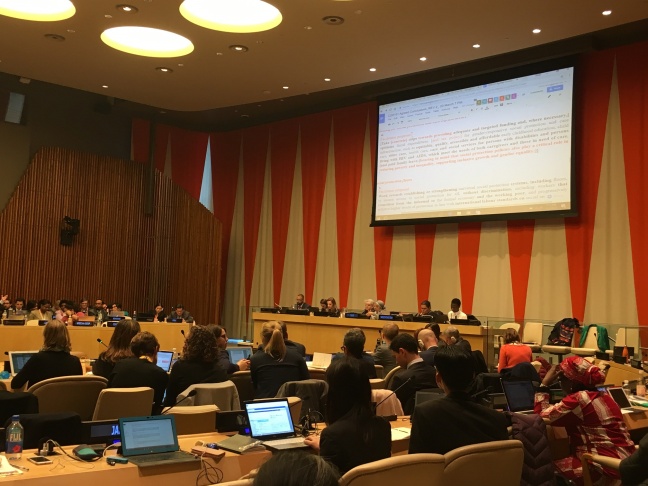 Ongoing heated discussions to reach consensus on the Agreed Conclusions
Ongoing heated discussions to reach consensus on the Agreed Conclusions
Two weeks of meetings at CSW61 ended with its Chair, H.E. Mr. Antonio de Aguiar Patriota of Brazil selecting David Donoghue of Ireland as the Chair of the 62nd and 63rd sessions, and Vice-Chairs from Colombia and Kenya. The theme of CSW62 will be “Challenges and opportunities in achieving gender equality and the empowerment of rural women and girls.”
 Chair Patriota giving his closing address at CSW61
Chair Patriota giving his closing address at CSW61
Numerous side events organized by NGOs and parallel events hosted by other organizations were held inside and outside of the main venue during the session. These involved reports, panel discussions and workshops addressing this year’s priority theme: women’s economic empowerment, and the 17 SDGs that underpin it. Attendance at each venue exceeded seating capacity, and the two-week session reflected the fervent way in which people around the globe feel and think about gender equality.
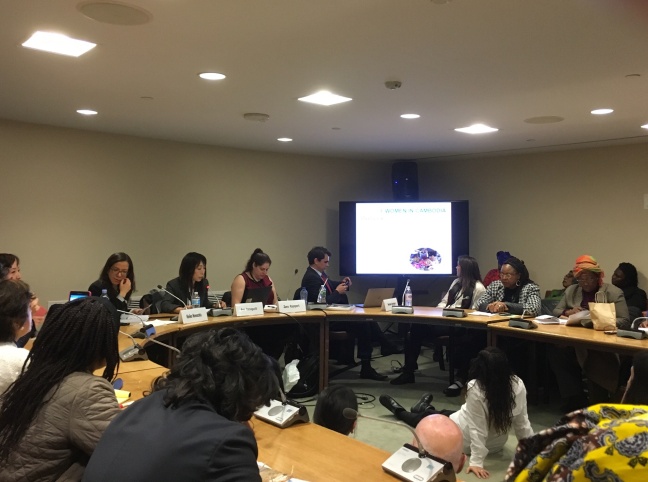 A side event organized by JICA
A side event organized by JICA
Overcoming the barriers to women's economic empowerment for 2030, a side event co-sponsored by JICA (Japan International Cooperation Agency) and the OECD (Organization of Economic Cooperation and Development)
For details of CSW61 and its Agreed Conclusions, please refer to documents and videos available on the UN Women website noted below.
Available in English and other official languages
International Cooperation
- International Seminar
- FY2019 Seminar for Gender Equality Officers and Women Leaders in the Asia Region
- FY2018 Seminar for Gender Equality Officers and Women Leaders in the Asia Region
- FY2017 Seminar for Gender Equality Officers and Women Leaders in the Asia Region
- FY2016 Seminar for Gender Equality Officers and Women Leaders in the Asia Region
- FY2015 Seminar for Gender Equality Officers and Women Leaders in the Asia Pacific Region
- FY2014 Seminar for Gender Equality Officers and Women Leaders in the Asia Pacific Region
- FY2013 Seminar for Gender Equality Officers and Women Leaders in the Asia Pacific Region
- FY2012 Seminar for Gender Equality Officers and Women Leaders in the Asia Pacific Region
- FY2011 Seminar for Gender Equality Officer and Women Leaders in the Asia Pacific Region
- FY2010 Empowerment Seminar for Women Leaders in the Asia Pacific Region
- FY2009 Empowerment Seminar for Women Leaders in the Asia Pacific Region Final Report
- FY2008 Empowerment Seminar for Women Leaders in the Asia Pacific Region
- FY2007 Empowerment Seminar for Women Leaders in the Asia Pacific Region
- FY2006 Empowerment Seminar for Women Leaders in the Asia Pacific Region
- NWEC Global Seminar
- FY2025 NWEC Global Seminar: Addressing Technology-Facilitated Gender Based Violence (TFGBV): Approaches to Eradicate the Invisible Harm
- FY2024 NWEC Global Seminar: Gender Equality and Care
- FY2023 NWEC Global Seminar: Gender Mainstreaming & Strengthening Institutional Mechanism with Gender Perspective
- FY2022 NWEC Global Seminar: Does Digital Technology Advance Gender Equality?
- FY2021 NWEC Global Seminar: Combating Gender-Based Violence – “Building Back Better” from the Covid-19 Crisis
- FY2020 NWEC Global Seminar: Covid-19 and Gender
- FY2019 NWEC Global Seminar: Gender and Media
- FY2018 NWEC Global Seminar: Promotion of the Advancement of Women - What Japan can learn from Iceland about Gender Equality?
- FY2017 NWEC Global Seminar: Promotion for Advancement of Women Lessons from Germany
- FY2016 NWEC Global Seminar: Promotion for Advancement of Women –Lessons from Europe
- FY2015 International Symposium: Gender Equality and Women's Empowerment
- FY2014 International Symposium: Keys to Diversity and Women's Leadership
- FY2013 NWEC International Symposium:Gender Equality for Men
- FY2012 NWEC International Symposium:To Make a Society without Violence against Women a Reality
- FY2011 NWEC International Symposium
- FY2010 International Forum for Women's Empowerment
- FY2009 International Forum for Women's Empowerment
- FY2008 International Forum for Women's Empowerment Final Report3
- FY2008 International Forum for Women's Empowerment Final Report2
- FY2008 International Forum for Women's Empowerment Final Report1
- Cooperation with JICA
- FY2025 Knowledge Co-Creation Program (KCCP): "Promotion of Global Networking on Anti-Trafficking in Persons"
- FY2025 Knowledge Co-Creation Program "Eradicating Sexual and Gender-Based Violence (SGBV)"
- FY2025 Knowledge Co-Creation Program: Bangladesh “Strengthening Capacity to Address Gender-Based Violence"
- FY2024 Knowledge Co-Creation Program on "Promotion of Global Networking on Anti-Trafficking in Persons"
- FY2024 Knowledge Co-Creation Program "Eradicating Sexual and Gender-Based Violence (SGBV)"
- FY2023 Knowledge Co-creation Program "Promotion of Networking among ASEAN Countries on Anti-Trafficking in Persons”
- FY2023 Knowledge Co-Creation Program "Eradicating Sexual and Gender-Based Violence (SGBV)"
- FY2022 Knowledge Co-creation Program "Promotion of Networking among ASEAN Countries on Anti-Trafficking in Persons”
- FY2022 Knowledge Co-Creation Program "Eradicating Sexual and Gender-Based Violence (SGBV)"
- FY2021 Knowledge Co-creation Program "Promotion of Networking among ASEAN Countries on Anti-Trafficking in Persons”
- FY2020 Knowledge Co-creation Program "Promotion of Networking among ASEAN Countries on Anti-Trafficking in Persons”
- FY2019 Knowledge Co-creation Program "Promotion of Networking among ASEAN Countries on Anti-Trafficking in Persons”
- FY2018 Knowledge Co-creation Program "Promotion of Networking among ASEAN Countries on Anti-Trafficking in Persons”
- Issue-specific Training “Seminar on Promotiom of Networking among ASEAN Countries on Anti-Trafficking in Persons”
- Basic Information-Gathering Survey/Workshop Seminar on the Economic Independence for Women in Central America and the Caribbean (El Salvador/Dominican Republic)
- Regional Gender Seminar in Central and South America
- 2015 Issue-specific Training "Seminar on Promotion of Networking among Asian Countries on Anti-Trafficking in Persons"
- Seminar on the Promotion of Education for Girls and Women II
- International Conference/International Exchange
- Online meeting with Seisen International School elementary students
- Visitor: Mansfield Fellows
- Visitor:JICA Knowledge Co-Creation Program (KCCP) on "Women's Empowerment through Business for Central American Integration System (SICA) Member Countries"
- The 68th Session of the Commission on the Status of Women
- Visitor: Madam Sustjie Mbumba, First Lady of the Republic of Namibia
- Workshop of commemorating the donation of the Beate Shirota Gordon archive materials
- Meeting with Korean Women’s Development Institute (KWDI)
- The Coalition of Finnish Women's Associations (NYTKIS) Secretary General Ms. KAKKOLA’s Courtesy Call to Foreign Minister KAMIKAWA
- The Coalition of Finnish Women's Associations (NYTKIS) Secretary General Ms. KAKKOLA’s Japan Visit Program
- The 67th Session of the Commission on the Status of Women
- NGO CSW67 Forum
- Webinar with Korean Women’s Development Institute (KWDI)
- The 66th Session of the Commission on the Status of Women (Hybrid format)
- Online meeting with international graduate students from the Appropriate Technology course at the University of Tsukuba
- The 65th session of the Commission on the Status of Women
- Lecture "The Beate Sirota Gordon Archives at Mills College"
- Participation in 2nd AGenT
- The 64th session of the Commission on the Status of Women
- Dr. Wang from National Taiwan University visits NWEC
- Japan Network of Women Engineers and Scientists and The Japan Inter-Society Liaison Association Committee for Promoting Equal Participation of Men and Women in Science and Engineering: 9th Japan Korea China Women Leaders Forum for Science & Technology
- Researcher from the KWDI visits NWEC
- Visit by a delegation from the Socialist Republic of Vietnam Ministry of National Defense
- Briefing on the Reykjavik Index for Leadership
- Women's Archives Center Exhibition "Beate Sirota Gordon and gender equality in Japanese Constitution"
- Visit from the Guangxi Women’s Federation
- Participation in the 63rd Session of the Commission on the Status of Women
- 7th Global Forum on Gender Statistics
- FY2018 International Symposium hosted by Korean Institute for Gender Equality Promotion and Education “Gender Equality at Schools”
- Visit from All-China Women’s Federation(ACWF)
- Participation in the 62nd Session of the Commission on the Status of Women
- The 14th KIGEPE International Symposium “Empowering Women’s Leadership: expanding influence and innovation”
- Participation in the 61st Session of the Commission on the Status of Women
- Visit from the Batis Center for Women
- 2011 Asia Women Eco-Science Forum (a forum of science and engineering leaders in Japan, China and Korea)
- The 60th Session of the Commission on the Status of Women
- The 59th Session of the United Nations Commission on the Status of Women
- The 58th Commission on the Status of Women
- The 57th Session of the United Nations Commission on the Status of Women
- International Symposium: Gender Awareness Education for Sustainable Development
- Thirtieth Anniversary Programs
- Attendance at the Ceremony Commemorating the 25th Anniversary of the Korean Women’s Development Institute (KWDI)
- Japanese-Filipino children (JFC)* from the Philippines-based NGO “DAWN” visit the Center
- Visitors from Abroad to NWEC
- Research report on Multicultural Family Support in South Korea
- Workshop on Gender and Education: Life-long Learning for Women’s Empowerment
- Lecture Delivered by a Visiting Researcher
- Connections: Bringing Together the Next Generation of Women Leaders in Science, Technology, Engineering and Mathematics
- Conclusion of Memorandum of Understanding on Exchange and Cooperation with the Ministry of Women's Affairs, Royal Government of Cambodia
- Visit to Japan by the Minister of Women’s Affairs of the Royal Government of Cambodia
- KIGEPE Delegation Visit
- Officials of Ministry of Information and Communications of the Socialist Republic of Vietnam visited NWEC
- The 56th Commission on the Status of Women
- Dr. Barker's visit
- Multidisciplinary Intellectual Exchange for Women Leaders from the United States, Japan, South Korea and the Philippines
- Courtesy visit to University of Hawai`i
- Delegation of Board for the Advancement of Women, Ministry of Finance of the Socialist Republic of Vietnam visited NWEC
- Visit Korean Women's Development Institute (KWDI)
- Report on Participation in the 5th World Social Forum on Migration
- A group led by the Vice President of the Korean Women's Development Institute visited NWEC
- A disaster management specialist from India visits the Center
- Visit to the Korean Institute for Gender Equality Promotion & Education (KIGEPE) and others
- Secretary of State, Ministry of Justice, Kingdom of Cambodia visited NWEC
- Research conducted in the Republic of the Philippines
- Research on the Comparative Study of the Gender Equality Policy in Southeast Asian Countries in the Kingdom of Cambodia
- Ochanomizu University and A Canadian Women’s Study Researcher visited NWEC
- Aigyung Yang, Research Fellow and Former Director of Strategy Board for Women Friendly Policies of the Korean Women's Development Institute (KWDI) Visits NWEC
- Delegation of the Ministry of Defense of the Socialist Republic of Vietnam visited NWEC
- Delegation from the Women and Development Center, of the Vietnam Women's Union, Visited NWEC
- The "7th Asia-Pacific Forum on Development and Gender" was held in Seoul, South Korea
- HOME
- International Cooperation
- International Conference/International Exchange
- International Conference/International Exchange
- Participation in the 61st Session of the Commission on the Status of Women


